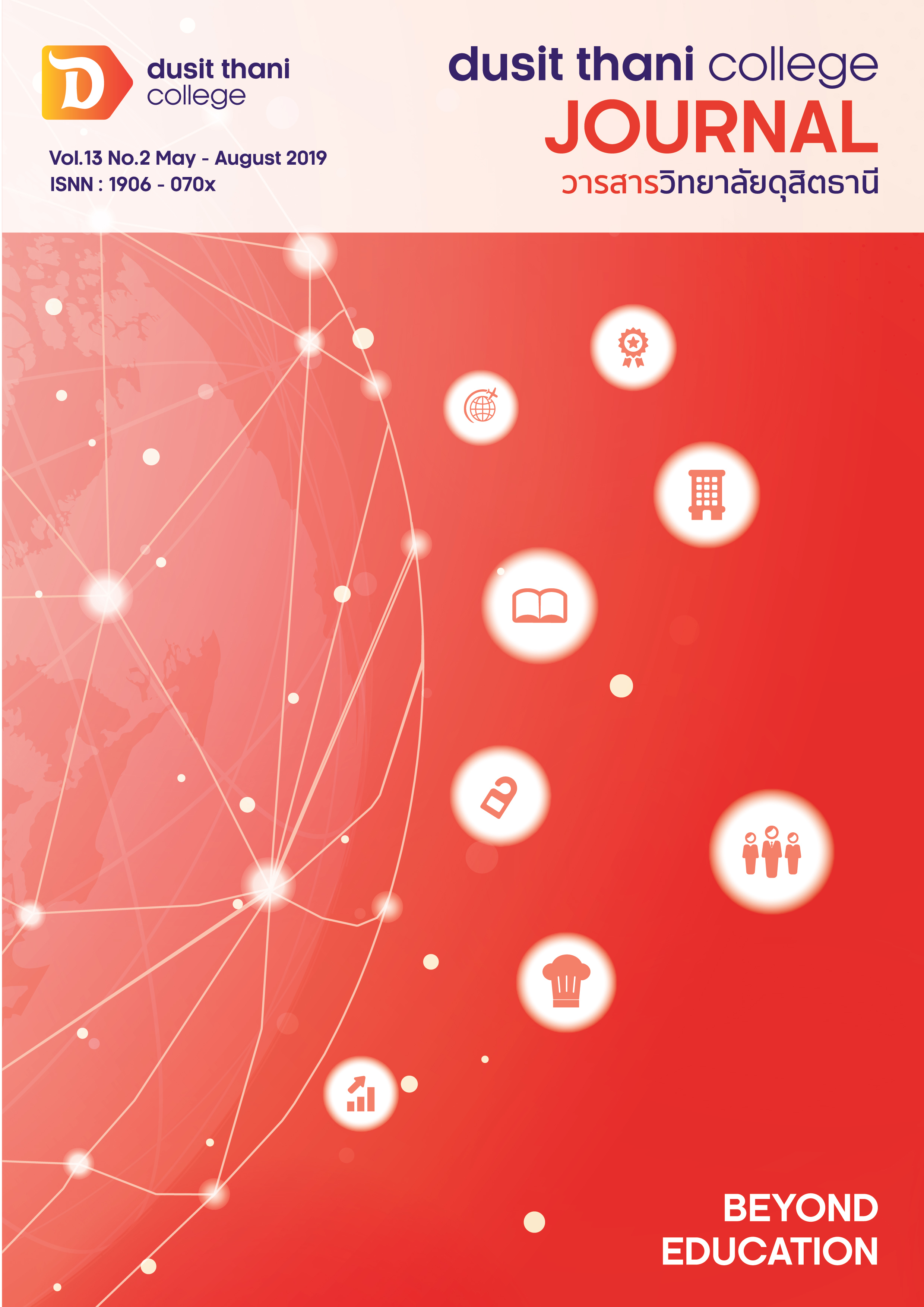Creative Tourism Planning and Development for Cities in The Southeast Asian Region
Main Article Content
Abstract
This research contributes to the existing literature by examining the complexity of the key elements of a creative tourism city, using Delphi technique to understand the concept and current practice of creative tourism in the Southeast Asian region. The objectives of this study were to: (1) study the role of tourism in city development, (2) define the concept of a creative tourism city within Southeast Asia region, and (3) evaluate the importance of key factors in planning and development of a creative tourism city
The study has confirmed that tourism plays an important role in city development. The concept of a creative tourism city within the Southeast Asian region is defined and guidelines to balance and maintain the sustainability of a destination, not only on economic development, but also including social-cultural and environmental aspects are provided in this study. The findings of this research are expected to assist creative tourism city stakeholders at national and local levels to improve their practices, and facilitate and encourage stakeholders to participate in planning and decision making processes that could lead to the success of creative tourism city development in the Southeast Asian region.
Article Details
Article Screening Policy
- All research and academic articles to be published must be considered and screened by three peer reviews in the relevant field / article.
- All articles, texts, illustrations and tables published in the journal are the personal opinions of the authors. Editors don't always have to agree. And no responsibility whatsoever is the sole responsibility of the author.
- The articles to be published must never be published. Where did you first publish? And not in the consideration of other journals If the audit found that there has been a duplicate publication It is the sole responsibility of the author.
- Any article that the reader sees as being plagiarized or impersonated without reference. Or mislead the work of the author Please let the journal editor know it will be your greatest blessing.
References
2. Custer, R.L., Scarcella, J.A., and Stewart, B.R. (1999). The modified Delphi technique:
A rotational modification. Journal of Vocational and Technical Education, 15 (2), 1-10
3. Cyphert, F.R. and Gant, W.L. (1971). The Delphi technique: A case study. Phi Delta Kappan, 52, 272-273.
4. Delbecq, A.L., Van de Ven, A.H., and Gustafson, D.H. (1975). Group Techniques for Program Planning. Glenview, IL: Scott, Foreman, and Co.
5. Fernandes, C. (2011). Cultural planning and creative tourism in an emerging tourist destination. International Journal of Management Cases, Special Issue:
Circle Conference, 629-636 (8).
6. Florida, R. (2002). The Rise of The Creative Class. New York: Basic Books.
7. Hsu, C.C. and Sandford, B.A. (2007). The Delphi technique: Making sense of consensus. Practical Assessment, Research and Evaluation. A Peer-Reviewed Electronic Journal, 12 (10), 1-8.
8. Jacobs, J.M. (1996). Essential assessment criteria for physical education teacher education programs: A Delphi study. Doctoral Dissertation, West Virginia University, Morgantown.
9. Karski, A. (1990). Urban tourism- a key to urban regeneration. The Planner, 76 (13), 15-17.
10. Lorentzen, A. and Hansen, C. J. (2009). The role and transformation of the city in the experience economy: Identifying and exploring research challenges. European Planning Studies, 17(6), 817–827.
11. Ludwig, B. (1997). Predicting the future: Have you considered using Delphi methodology? Journal of Extension, 35 (5), 1-4.
12. OECD (2014), Tourism and the Creative Economy, OECD Studies on Tourism, OECD Publishing.
13. Oh, H., Fiore, A.M. and Jeoung, M. (2007). Measuring experience economy concepts: tourism applications. Journal of Travel Research, 46 (2), 119-131.
14. Okoli, C. and Pawlowski, S.D. (2004). The Delphi method as a research tool: an example, design considerations and applications. Information and Management, 42 (1), 15-29, DOI: http://dx.doi.org/10.1016/j.im.2003.11.002
15. Page, S.J. and Hall, C.M. (2003). Managing Urban Tourism. London: Pearson Education
16. Richards, G. (2009). Creativity and the art of distinction. Paper presented at the conference Creative Spaces for Cultural Tourism, Istanbul, 19-21 November 2009.
17. Richards, G. (2010). Tourism development trajectories- From culture to creativity?.
Encontros Cientificos- Tourism & Management Studies, 6, 9-15.
18. Richards, G. (2011). Creativity and tourism: The state of the art. Annals of Tourism Research, 38 (4), 1225-1253.
19. Richards, G. (2013). Creativity and tourism in the city. Current Issues in Tourism, 2013 Retreived from http://dx.doi.org/10.1080/13683500.2013.783794.
20. Richards, G. and Raymond, C. (2000). Creative Tourism. ATLAS News, 23, 16-20.
21. Spirou, C. (2011). Urban Tourism and Urban Change. Routledge: New York.
22. UNCTAD (2008). Creative Economy Report 2008: The challenge of assessing the creative economy: towards informed policy-making. Retrieved from http://unctad.org/en/docs/ditc20082cer_en.pdf
23. World Bank (2014), Cities alliance annual report 2014 (English). Washington, D.C.:
World Bank Group. Retrieved from http://documents.worldbank.org/curated/en/381881468188332237/Cities-alliance-annual-report-2014
24. World Tourism Organization (2012), Global Report on City Tourism – Cities 2012 Project, UNWTO, Madrid


